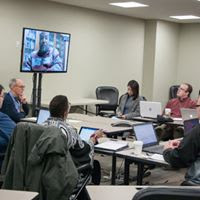 |
| Add caption |
So you’ve just received your Master of Divinity degree from
an accredited seminary. What are you
going to do now? Some students go right
from seminary to a full-time ministry position.
Others are already in a ministry role and continue in that position with
enhanced skills and abilities. Many
students, however, do not immediately find a full-time or even part-time
ministry role.
Let me tell the story of one of these students.[i] Lisa graduated several years ago with a
Master of Divinity degree. She was
active in a local church and worked part-time as a barista in a coffee shop. No formal ministry role opened immediately,
so she went full-time with the coffee shop and eventually became a
manager. She did not give up her ministry
dream, however. She discovered a local
new church start that was developing a unique concept--opening a coffee shop
that would also serve as a neighborhood social hub and the center of worship
for the new congregation. Today she
carries one of the primary responsibilities for leading this ministry.
Increasingly, Lisa’s situation is becoming more
commonplace. This may not be a bad thing
since it opens opportunities for seminary trained women and men to practice
ministry in new and innovative ways.
In a recent blog from the Association of Theological
Schools, Packard Brown suggests a strategy for guiding MDiv graduates into
fields other than congregational ministry.
These include, but are not limited to, careers in teaching, counseling,
advocacy, nonprofit administration, or corporate human resources. In these roles, the graduate may function as
a worker-priest, earning a living in a secular or service role while fulfilling
their ministry goals.
A good seminary education provides a graduate with a number
of skills:
1. The ability to
work with people. Students have usually
been involved in group projects, done internships in church or organizational
settings, and often have done work in pastoral counseling and care. In all of these situations, they have been
supervised and given constructive feedback to enhance their people skills.
2. They know how to
research problems and organize things.
Whether it is writing a paper or developing a capstone project, students
learn where to find information and resources and then put these together in a
workable format.
3. In most cases,
they have discovered how to be lifelong learners. They have become aware of their strengths and
weaknesses and how to use the former and complement the latter with additional
learning and relationships. Just because
they have a degree, they refuse to believe that learning over.
4. They have a
healthy spirituality that will sustain them as they seek to live out what they
perceive as God’s purpose for them. They
practice spiritual disciplines that strengthen their daily lives and seek out
communities of faith that will encourage them.
These skills are transferable to many contexts. As we think more broadly about the nature of
ministry in the 21st century, new doors open and opportunities
appear for the prepared.
Comments